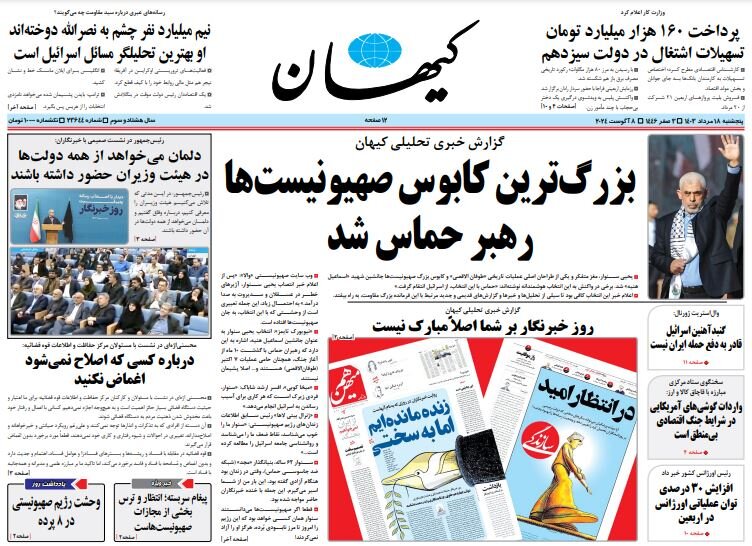Israel is afraid of Iran's various missile capabilities

TEHRAN - In a commentary, Kayhan dealt with the analysis of the recent developments on the website of Radio France. It wrote: According to Radio France, Israel is afraid of Iran's various missile capabilities.
Experts make various predictions about Iran's military response against Israel. Israel has prepared itself for any possible attack by Iran and its allies, especially Hezbollah. According to experts, including Bernard Hourcade, a French Iranologist, Iran's large-scale missile and drone attack on Israel on April 14 proved the fact that Iran can attack from a distance and can launch more than 300 explosive projectiles into Israel. The Israelis consider Iran's missile power to be the key element of Iran's military power, and to destroy Iran's missiles and drones, it has several layers of surface-to-air defense systems, apart from itself and its allies' advanced aircraft. However, according to experts, Israel is afraid of two things in case of a coordinated attack by Iran and its allies. First, they have hundreds of thousands of rockets and it is very difficult to track them at the same time. Second, it is afraid of facing a shortage of anti-missile missiles in the long run.
Etemad: The last struggle for peace
In a note, Etemad addressed the presence of the Acting Minister of Foreign Affairs, Ali Bagheri kani, at the emergency meeting of the Organization of Islamic Cooperation in Saudi Arabia to condemn the terrorist actions of the Israeli regime and said: In a statement, the Organization of Islamic Cooperation condemned the crimes of the Israeli regime in the assassination of resistance figures, especially Ismail Haniyeh, and also the killing of the people of Gaza. This is while, in clear support of the Israeli regime, American and British fighters attacked targets in Taizz province in the south of Yemen. The recent terror attacks have brought the region closer to the verge of a full-scale war. These actions of Israel can have devastating consequences for the Middle East and beyond. A group of analysts claim that Iran's response to Israel is imminent, but it will probably be to the extent that it does not lead to wider and regional tension. According to Iranian affairs analyst Reza Akbari, Iran will respond to Haniyeh's assassination, but it is unlikely that this response will be designed in a way that ends in a full-scale war.
Donya-e-Eqtesad: Netanyahu wants war with Iran
In an analysis, Donya-e-Eqtesad investigated the developments in the region in the future. The paper said: Israel has not been able to accept in general how their international position has decreased in the last 10 months. The United States has provided material and military support to the regime during Israel's war against Gaza but has also urged its main ally in the region not to take hasty actions that would escalate tensions with Iran and its allies. The cease-fire in Gaza leads to a reduction in tension between Israel and its regional enemies. But Netanyahu has talked about Iran's threat for years and pressured America to deal with it. He may now try his luck. According to Goldberg, the consensus in Israel is that Netanyahu wants a war with Iran, and he has tried for it. According to analysts, a comprehensive war in the region will be avoided if Iran achieves the right balance in its response.
Ham Mihan: Israel does not want peace
In an article, Ham Mihan discussed the impact of Haniyeh's assassination and Sinwar's election on the equations of Gaza and the region. It wrote: Israel killed Ismail Haniyeh to prolong the war with Gaza. Also, Israel's hatred of Yahya Sinwar and their continuous attempt to assassinate him has caused Israeli leaders to call him "the walking dead". Over the past 40 years, Israel and the West have repeatedly accused the Islamic Republic of Iran of obstructing the path of peace and ending the Israeli-Palestinian conflict. They also by propaganda published the fake narrative that Iran wants to throw Israelis into the sea in order to gain sympathy and build consensus against Tehran. Iran does not believe in a two-state solution to the Palestinian issue and this has historical roots, but it has not caused Tehran to consider this issue as an obstacle to the support of the Islamic world and the international community. In this context, Tehran has supported and voted positively for all the statements and resolutions that have been issued in these years, especially after the Israeli attack on Gaza, regarding the need to end the crisis and the war and to resolve the Palestinian issue, in which the issue of a two-state solution has been raised.
Leave a Comment